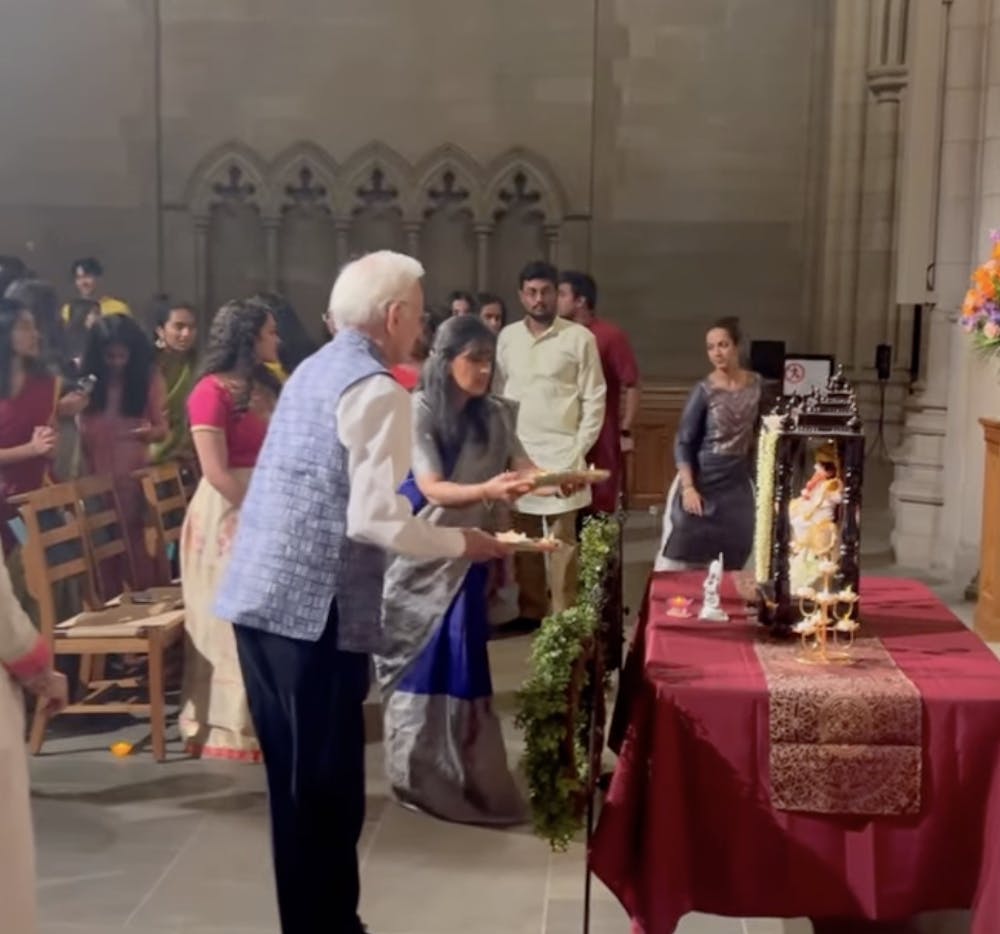To celebrate the Hindu holidays of Vijayadashami and Navaratri, Duke’s Hindu Student Association (HSA) held a Navaratri event on Tuesday, Oct. 24 from 6 pm to 7:30 pm in the Duke Chapel. The annual Hindu event comprises religious ceremonies, music, singing and food.
Navaratri, directly translated in Sanskrit to mean nine nights, is a Hindu festival that honors the goddesses in Hindu religion. The nine days are split up to equally honor the three incarnations of the Goddess Durga, the supreme goddess. The first three days are dedicated to Durga or Kali, the goddess of protection, strength and motherhood. The next three are dedicated to Lakshmi, the goddess of wealth, luxury and beauty. The remaining three are dedicated to Saraswati, the goddess of knowledge, music and art. The three goddesses are directly linked to a male Hindu god counterpart: Shiva, Vishnu and Brahma, respectively.
According to the Hindu story behind this holiday, during the long nine days and nights of Navaratri the Goddess Durga descended to Earth to fight the demon Mahishasura. It was only until the tenth day that she was able to defeat him; this tenth day is celebrated as Vijayadashami, the final day of Navaratri. The word “Vijaya” means victory in Sanskrit; this day celebrates the victory of good over evil.
This year, the festival started on Oct. 15 and ended with Vijayadashami on Oct. 24. The event is usually filled with cultural food, clothing and performances. How the festival is celebrated often depends on where in South Asia it is being celebrated: traditions in Nepal (where it is often referred to as Dashain) differ from traditions in Sri Lanka. Traditions and customs range from fasting and restricted diets to bhajans, or religious devotional songs. Celebrations may also involve dance performances that act out the legendary scene of Durga defeating Mahishasura through dance styles of garba or bharatanatyam.
One aspect, however, that is widely practiced throughout the Hindu population is the art of pooja. Pooja, also known as arti, refers to worship rituals that Hindus perform to honor their gods and goddess. Temples and Hindu households often have an altar set up with idols, flowers and jewelry to which Hindus say prayers and chants to admire the past and ask blessings for the future.
This year’s HSA Navaratri event brought together Hindi students and faculty at Duke to celebrate Vijayadashami. Attendees were greeted by HSA members at the door dressed in colorful and elegant cultural clothing, which many guests also complimented with their own cultural clothing. The walkway of the chapel was lined with diyas, or lights. The front of the chapel was also decorated with an altar, plentiful fruit and flowers, and a mini-stage where the performers would stand.
The event begins with introduction by the HSA executive board which put this program together. Following the welcome, HSA invited Priya Ameresh, Duke’s Hindu Chaplain, to the microphone to speak a few words about this holiday. Ameresh discussed the importance of Navratri and as well as of Hinduism itself. She highlighted the big ideas the holiday was honoring, specifically good over evil, importance of knowledge and the merit of wealth. She also asked the crowd to reflect on their time at Duke. After Ameresh’s commemorative speech, Kishor Trivedi, Professor of Electrical and Computer Engineering at Duke, was called onto the stage. Trivedi furthered the discussion about current religious significance of Navaratri versus its history in terms of Sanskrit scripture. He also detailed the honoring of Lord Ganesha, another major deity in the Hindu religion. Finally, Trivedi closed by applauding the efforts of HSA in planning such events and providing a community for Hindus at Duke.
These speeches were then followed by an array of performances. First to perform was Duke Sangeet, Duke’s premier Indian classical music group. Sangeet performed several Hindu bhajans which the crowd also joined in. Musical instruments were also utilized by this group like the sitar, bansuri, dholak and Indian harmonium. One of Sangeet’s performers, Anvi Charvu, followed after with a solo performance of another bhajan. Indian singing is distinctive for its riffs and runs, which Charvu was able to execute just as well in her bhajans. Both performances include singing in Hindi as well as in Sanskrit. To finish off the performances, Duke Deewana, Duke’s South Asian a cappella group, performed their rendition of the Chogada, a popular garba bollywood song, ending the event on a lively note.
To conclude the night, HSA held a pooja where attendees could come closer to the altar and pay their respects to the gods. Hindu music played in the background as shoe-less Hindus said prayers and recited chants. On the way out of the Chapel, HSA provided samosas and ladoos to attendees as a prasad, or religious offering, for thanksgiving to the gods.
Get The Chronicle straight to your inbox
Sign up for our weekly newsletter. Cancel at any time.

